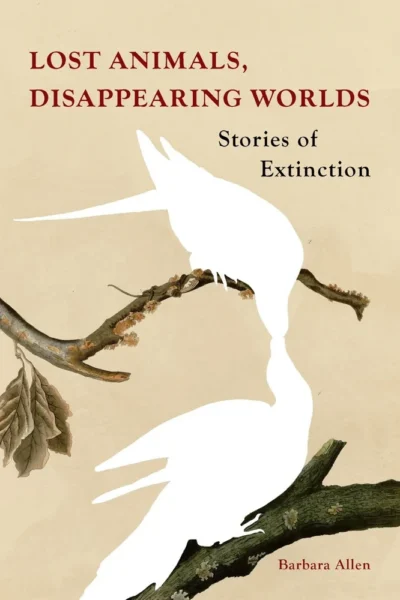
What would the last living passenger pigeon (seen in silhouette above) have to say if he or she were alive today? Or the Tasmanian tiger? Or the Carolina parakeet?
In Lost Animals, Disappearing Worlds: Stories of Extinction, author Barbara Allen gives voice to 31 extinct species, writing:
Animals cannot tell their stories, so animal biography has become a genre. I cannot enter a non-human animal’s mind. I can imagine parts of its experience, but I am not a thylacine, a heath hen, a Rocky Mountain locust or a great auk. I draw upon the facts that we have about them and hope that by hearing and understanding part of the story of their existence and extinction, we may become more mindful of other species who need our prompt attention. … I try to focus the lens so that it rests up on the solitary unique individual, while refracted through the prism of the species, or subspecies.
Each animal’s story is both informative and heartbreaking. Like the dodo, who’s name reflects the challenges this animal faced as humans arrived on its shores. Allen writes:
What a stupid name! Sets me up as a thing of ridicule; if one is not accorded respect, it is easier to kill. … The Dutch called us dronte, which means ‘swollen’, and dodder, which translates as ‘sluggard’ — hardly the names given to a species one would cherish.
The dodo was one of many “island species” that proved particularly vulnerable to human colonization. They simply had nowhere to run. Humans not only preyed upon them, but introduced new predators, such as pigs, dogs and rats.
But even those animals free of islands were not free of humans and their insatiable greed.
Consider the Stellar sea cow:
We did not fear a predator we had not met before, so we were easy to kill. It was our end. it took only 27 years from the ‘discovery’ of us, to our wiping out. Think of what you humans have missed out on, learning bout us. In 1754 there was a human who cared, or at least was concerned that a ready food source would have ben entirely depleted. His name was Jakovleff, first name unknown. He was a Russian mining engineer, who had seen the destruction of us on Copper Island. He petitioned the authorities to protect the animals on Bering Island, but no one listened.
I was not aware of a number of these species, such as the Falklands Islands wolf. Allen writes:
Darwin made the prophetic remark that we could become extinct: ‘Within a few years after these islands shall have become regularly settled, in all probability this fox will be classed with the dodo, as an animal which has perished from the face of the earth.’
These are challenging stories, not just for witnessing the suffering of another species but for seeing the human species reflected back at us. And yet it’s important to read these stories. To remember those who were lost.
Allen writes: “We humans are forgetful creatures. Memorials are needed — in many cases are essential — for the deep act of remembrance.”
This book is a fitting memorial to them.
John is co-author, with Midge Raymond, of the mystery Devils Island. He is also author of the novels The Tourist Trail and Where Oceans Hide Their Dead. Co-founder of Ashland Creek Press and editor of Writing for Animals (also now a writing program). More at JohnYunker.com.
